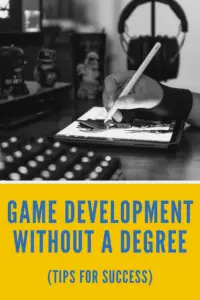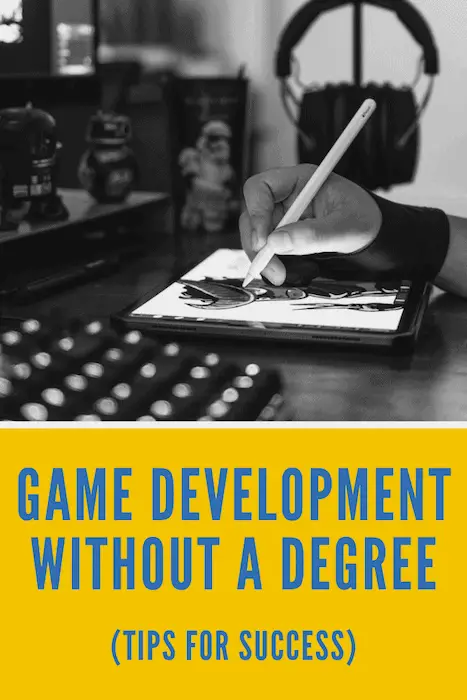Can You Become a Game Developer Without a Degree?
Developing video games is an amazing career path for anyone passionate about playing and making games. Many people interested in becoming a game developer wonder if it’s possible to do so without a college degree, so I put together this guide to provide some answers.
Can you become a game developer without a degree? The answer is yes. While a degree can at times make it easier to get a job with a large game development company, you do not need a degree to become a video game developer. The most important factors when applying for a game developer position are your portfolio, previous work experience, and connections in the industry.
If you’re considering starting your game developer career without a degree, here are a few tips that will help you be successful.
Tips for Becoming a Game Developer Without a Degree
Start Developing Games Right Now
The main mistake that aspiring game developers make is that they never get started. Making a video game can seem like a daunting task without any coding ability or formal education in game development.
However, it’s good to keep in mind that everyone has to start somewhere. Even the biggest names in the game development industry had to learn to code at some point. So don’t hold yourself back.
If you want to make games, start making games.
There are tons of tools available that allow you to create polished video games without any coding knowledge. If you lack the knowledge you need to make your first game, there is little you can’t learn with the help of Youtube, Apps, and websites like mine, of course. 😉
The 2nd mistake I see aspiring game developers make is trying to take on too much too soon. It’s tempting to try to make your first game development project the huge game that you’ve always dreamed of, but the problem with this is that you lack the experience needed to successfully pull off such a project.
I’m not saying it’s impossible to make your first game a big one, but you’re more likely to burn out and lose your desire to develop games. It’s better to make your first handful of projects small and manageable games. Once you’ve completed a few games like this successfully, you can start working on something more challenging.
Teach Yourself About Game Development Without College
If you’re passionate about pursuing a career in video game development, begin by making yourself an expert in the subject.
Eat, sleep, and breath game development. Listen to audiobooks, Youtube videos, and podcasts while you drive to work or mow the lawn. Get your hands on as many video game development books as you can. Surround yourself with people who are further along and know more than you do.
Turn your brain into a treasure trove of game development knowledge. When you do, what you’ve learned will come out when you sit down to work on a game.
A mistake I’ve made in the past is not taking notes on the things that I’m learning. Keep something handy to write down new thoughts or ideas that inspire you. There’s a good chance you won’t remember them otherwise.
Make a Great Game Portfolio to Set Yourself Apart
If your goal is to land a job at a large game studio, one of the most important things to have is a great game development portfolio.
Video games aren’t cheap to make. Because of this, game studios need to be confident that the person they hire is capable of performing at the level that they need. The easiest way to give them confidence is with your portfolio.
Your portfolio should highlight the relevant projects that you’ve completed that showcase your various areas of expertise. If you’ve already created tons of small games, choose the best ones that relate to the position you’re applying for.
As far as the nuts and bolts of actually making a portfolio, the most popular route is an online portfolio. Putting together a simple website with images, videos, and descriptions of your best projects make it easy for game studios to get a feel for your skill level.
Ultimately, your portfolio can make or break your chances of getting the game development job you want, so it’s worth the time and effort to start building up a library of projects that you can draw from to create it.
Gain Experience As a Game Developer
After having a great portfolio, the next thing you’ll need is experience. While you’ll likely have a decent amount of experience if you have a well-rounded portfolio, it’s helpful to have any kind of hands-on experience working as a part of a game studio, even it’s just a small two or three-person team.
Developing video games with a team is far different from making a game by yourself. Depending on the size of the studio, working with a team can allow you to focus on a very specific area of a game.
However, in order to function like this, game studios need game developers with great communication skills that can work well with other personalities on the team.
Even if you don’t have a ton to show for the time that you spent working on a team, it’s still worth mentioning in your portfolio. Game studio drama is a very real thing, so finding friendly and personable people is a big priority.
Build Connections in the Game Development Industry
Building connections with people in the game development industry is important not only because you can learn a lot from being around professionals, but also because it can give you unique employment opportunities.
When a job becomes available and you already have your foot in the door, it’s possible that you can be hired for the job before they even announce its availability to the general public.
Here are the steps you might take to begin networking in the game development industry.
Determine Your Current Game Industry Contacts
It’s a small world, so more likely than not, you’ve already got at least one contact in the game industry whether you know it or not.
If you’re not certain if anyone in your life is a game industry guru on the down low, then the best way to find out is to ask. You can start by using social media platforms like Facebook or LinkedIn to find your first few connections. If none of your direct contacts are in the industry, you can ask if they have friends or connections who are.
Setup Meetings
Once you have one or more contacts, the next step is to set up a meeting with them. When you reach out to them, you should make it clear that you’re not trying to twist their arm into giving you a job. Rather, you want to get their advice and learn from their experience.
Come prepared with a list of questions and something to take notes with. This will show that you value their time and respect what they have to say. If it feels appropriate, you can ask if they have friends or acquaintances in the industries you’re interested in that they could connect you with.
Repeat the Process
With each meeting you have, you should hopefully walk away with one or two more contacts that you can schedule meetings with.
While it might seem like a lot of work, networking can pay off big time if you’re able to learn of opportunities you would otherwise have missed.
Should You Get a Degree to Become a Game Developer?
Whether or not it’s a good idea to go to get a degree to become a game designer will vary from person to person. To help you make the best decision for your situation, here are some of the pros and cons of both options.
Pros of Getting a Game Developer Degree
For jobs with numerous applicants, if you have a degree and a great portfolio, you’re more likely to get the job over someone without formal education who still has a great portfolio.
Going to college for a game design degree provides a structured learning environment where you can quickly and easily get feedback on your work, and gain access to learning resources you might not have otherwise.
Going into a game design program at college allows you to meet other like-minded people that you could potentially work on projects with in the future.
Cons of Getting a Game Developer Degree
Depending upon where you live, the cost of tuition for a game design program can be substantial. Meaning you might have to pay off student loans the rest of your life unless you design the next Flappy Bird.
For some personalities, being required to do something can drain their passion for it. If you’re one of these people, getting a game design degree probably isn’t for you.
If you’re a driven person, you can most definitely get a college-level education all on your own by avidly studying game development. If you’re this type of person, formal education can feel like it’s holding you back rather then helping you.
Whatever you decide is right for you, I wish you the best of luck in your game developing career. If you’re looking for more helpful resources about all things game design, you can check out more of my recent articles here.


